Robbie Williams: ‘I did an online test to see if I was a narcissist’

Robbie Williams sits in the Paris apartment where he and his family are living for a few summer weeks, the Eiffel Tower framed in the window behind him. As he talks, children of various ages periodically slip in and out of the room, seeking assorted kinds of attention and affection. ‘Life is really good,’ he tells me. ‘Life is really good.’
Anyone who has taken even cursory notice of Williams’ public journey will be aware that he has long struggled with the gap between the person he feels that he is and the person people perceive him to be, and with all that the life he has chosen requires of him.
For one thing, there is the conundrum that those who don’t know him often find near impossible to believe – that, as he puts it, ‘I am an introvert that does an extrovert’s job for a living.’ But in recent times, he says, things have been going well. He still has plenty to share about the disjunctions he experiences, but these days such tales are offered more as considered reflections on how things just happen to be and less as urgent updates on an ongoing crisis.
‘I was reading something about fame…’ he begins to tell me – and he’s already well aware of how this sounds and how anyone reading this might already be judging him – ‘…and there’s like four stages of fame. And I can’t remember the first three…’ He laughs at the self-reflexive absurdity of this detail. ‘But the fourth one is acceptance of what’s happened to you.’ His point is: maybe this is where he is now.
‘I’m not saying that I’ve reached some Zen-like state at all,’ he clarifies, ‘because I’m still a mass of insecurities, and I’m either everything or nothing at any particular moment. But there is a state of ease. Or easier than it’s been throughout my whole adult life.’
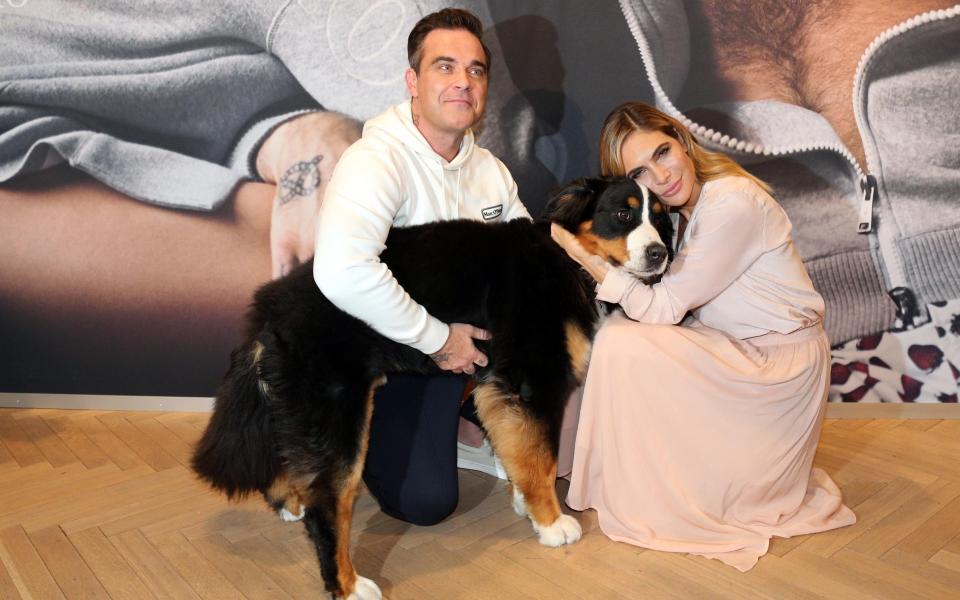
All that said, he is having a modest blip on the Tuesday I arrive. The family – Williams, his wife, Ayda Field, and their four children, Teddy, nine, Charlie, seven, Coco, three, and Beau, two – are here in Paris on holiday. (It’s a city his wife has a close connection with. ‘The kids all speak French,’ Williams notes. ‘I’m the only person in our family that doesn’t.’)
When they first got here, he did his best to throw himself into it all. ‘There’s the funfair,’ he says. ‘And the bridge with the locks on it. Did that. And then I did 10 days in a row being social and going out. It’s a record for me.’ In fact, he was photographed out and about so often – this family visit, he belatedly discovered, happened to coincide with Men’s Fashion Week – that he was later told he’d been trending online.
Then, last night, he found himself at one more event surrounded by actors and fashion insiders. ‘There was canapés,’ he tells me, ‘which is my least favourite of the -pés.’ But that wasn’t the problem. In truth, it was a perfectly fine evening full of people being perfectly nice. But, as it progressed, he nonetheless recognised the feeling that something within him had ruptured, and he knew that he wouldn’t be going out again for a while.
No huge deal, he emphasises. It’s just how it is. ‘These sort of things happen when I push myself to do more than I can do out in the big world,’ he explains. ‘Something breaks and then I get really scared and then I just have to stay in for a little while and recuperate. I just need to… what’s that thing you do when you come up too fast, so you don’t get the bends?’
Fortunately, he’s excellent at staying in, whether working away at countless projects on his laptop and iPad and in his head, or, as now, suffusing himself in family life – momentarily breaking off conversation to satisfy Coco’s request for an episode of Peppa Pig, and later agreeing to tuck Teddy and Charlie into bed. Whatever has been going right, family is clearly a part of it.
‘It’s not because I’m a f—king amazing dad,’ he says, ‘it’s because I really love being around them. I love them. It feeds me. I need that.’ He laughs. ‘As much as they’re super-annoying, you feel the love like those songs in the ’80s promised. When you grow up and you fall in love, it wasn’t like any of those songs. But with the kids…’ He starts singing: Watching in slow motion as she turns to me and says, you take my breath away.
‘It feels like that gushy, unbelievable, eternal, just sappiness that you feel inside.’As for where the family unit is based these days, when not on holiday, the answer is surprisingly unclear. ‘We’re still trying to figure it out, where we live,’ he says.
‘We actually don’t live live anywhere because we wanted a new adventure.’ There is a new house in Los Angeles that they will move into around Christmas, but as they continue to balance all the permutations – the children’s education, his itinerant work schedule and so on – that may not necessarily be home.
‘We’re still making it up as we go along,’ he explains. ‘I think we actually exist better in a caravan that’s constantly travelling.’ I ask him whether he likes that feeling. ‘Yeah,’ he replies. Why? ‘Because wherever I go,’ he considers, ‘eventually I’ll turn up.’

The following afternoon, we find ourselves deep into a conversation about how pronounced or otherwise Robbie Williams’ ego may be. ‘Well, let’s break it down,’ he suggests. ‘Loves himself? Well, I don’t. Loves his voice? I don’t. Loves his songs, thinks they’re the best? I don’t. But I do have an avaricious want and need for more of everything. So that’s where my ego is, I suppose. It’s really f—king complex.’
Just at this moment, Field comes to the door. He asks whether she will join us, then, as she takes a seat, vacillates. ‘I’m scared because then I’ll be vetting myself,’ he says.
‘You don’t have to vet yourself,’ she reassures him.
‘You’ll be like, “Oh, you can’t say that, you can’t say that,”’ he worries.
‘I don’t think it’s ever stopped you before,’ she notes. ‘But I’ll sit and try not to shake
my head in despair when you say something controversial.’
‘OK,’ he agrees, and brings her up to speed on our discussion. ‘We’re just dissecting ego.’
‘Oh, God,’ she says. ‘I was only going to pop in for a little bit.’
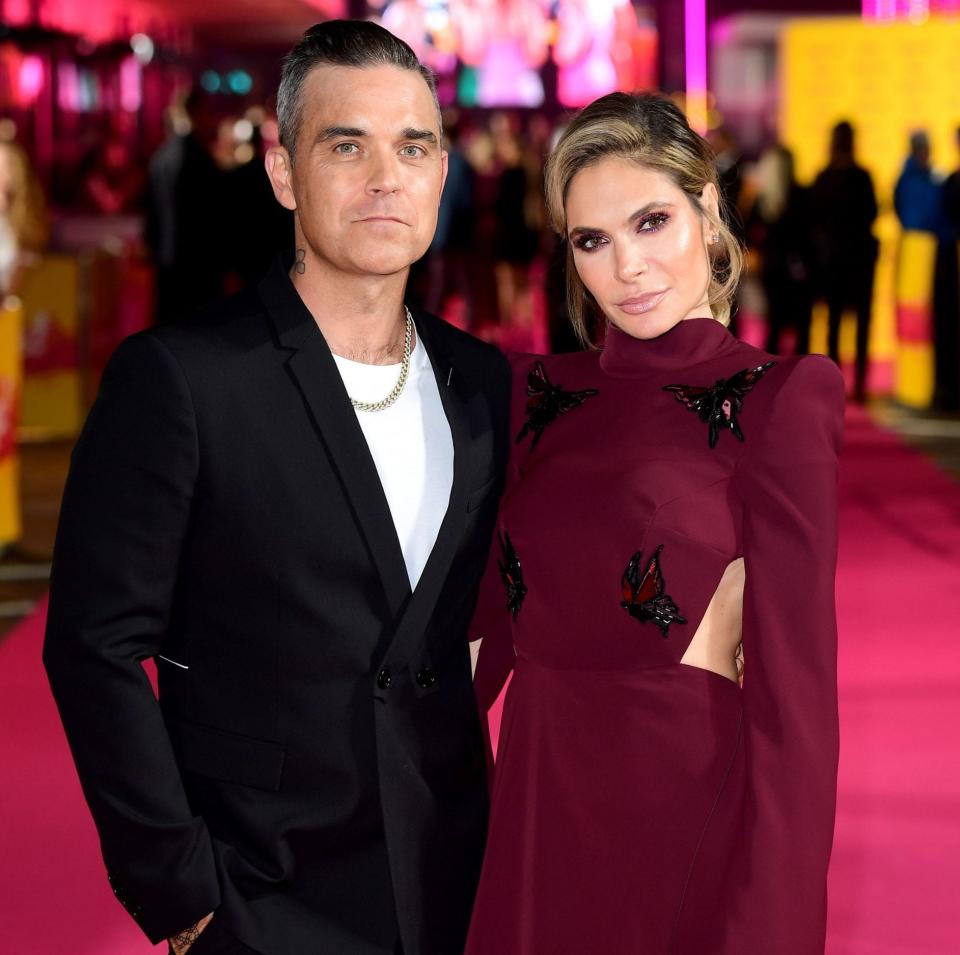
We return to debating the ways in which her husband is and isn’t egotistical. ‘People would consider ego archetypally to be somebody that’s full of their own self-importance and with an inflated sense of self,’ he continues, clearly meaning to indicate that he does not consider this a fair or appropriate self-description of who he really is.
‘Yeah,’ Field acknowledges, and she leaps right in with an intricate, articulate analysis of how his apparent extreme extroversion counterbalances the extreme introversion she knows.
Her words hanging in the air, Williams turns to me: ‘Can you say I said that?’ At this moment, Teddy and Charlie pay a visit. ‘Do you think Daddy has a big ego?’ Field asks them.
‘What’s an ego?’ asks Charlie.
‘I think I know,’ says Teddy. ‘Too full of about themselves?’
‘Do you think Daddy’s too full of about myself?’ Williams asks.
‘No,’ replies Teddy, loyally.
And it is at this point, just after the children leave, that Williams lets slip the sentence – one which I think should be compulsorily mandated in all celebrity interviews of any worth – ‘so I did an online test to see if I was a narcissist.’
A few things need to be noted at this juncture, before we move onwards. First, that, after saying this sentence, he does immediately face a certain amount of amused scorn from his two-person audience who seem instinctively united in the viewpoint that anyone minded to do an online test about whether they are a narcissist already has their answer.
Second, that, quite appropriately, he pushes back. ‘Hey, no, listen,’ he objects, ‘if there is so much levelled about people that are in the industry that I’m in, doing the job I do, where we’re accused of being narcissists and egomaniacs all the time, wouldn’t it be prudent to go, “Hey, what if I am – let’s go and check that out?”’
Fair point, though perhaps now is a relevant moment to mention the T-shirt he is wearing today. It depicts a fractured drawing of a face. His own face, in fact. Drawn by him. Alongside it are the words, written by him, I AM NO LONGER MENTALLY ILL'. (On the shirt’s left sleeve are some other words he has written: SAY DRUGS TO NO.)
When Rob did this online narcissism test, the reply he got was that he was not a narcissist. But he decides to do it again right now – this time, for better or worse, with potential input from two people who may have strong opinions about his answers.

‘What happens if we do establish that you are a narcissist?’ Field checks, before we start.
‘Then we just live with it,’ he says.
Teddy briefly returns. ‘Can you guys be with me?’ she requests. ‘Because I’m really bored.’
‘We’re trying to find out if Daddy’s a narcissist, baby,’ Field explains. ‘We’ll be with you in a minute.’
Off we go. There’s an easy consensus about some of his answers to the test’s questions. (It’s on psycom.net if you feel the need to compare.) For instance, we agree that ‘Do you find that you constantly have a willingness to take advantage of others to achieve your own goals?’ is a ‘never’, and that, ‘Do you find that you are often envious of others and/or believe that others are envious of you?’ is a ‘very often’.
But some are more awkward – for instance, ‘Do others perceive you as arrogant or snobby?’ The facts seem reasonably clear – that people who know him do not, but that as a pop star he’s routinely viewed this way – but he gets quite frustrated at any suggestion that his answer need reflect the second. ‘What I project out there is different,’ he argues. ‘We’re talking Robbie out there and I’m talking Rob. Please don’t do this to me.’ His view eventually prevails.
After he presses ‘submit’, a diagnosis appears: ‘Mild indication of narcissistic personality disorder.’ He seems OK with this. ‘See,’ he says to Field, ‘if I’d have answered yes to that question about “Do people perceive you as arrogant…?” I’d be a full-on narcissist now. But that would be unfair because that’s just an image that I’m projecting to facilitate our wonderful lifestyle.’
It would obviously be similarly unfair to choose this moment to ask him about the cover image of his new album XXV. So I do. On it, he appears naked, posing in imitation of Rodin’s The Thinker. (Some time back, when I’d asked him about this, he’d characterised the image as ‘It’s me, The Thinker-ish.’)
He explains now that, much as he understands the commercial imperative to show his face, he tired long ago of album cover photo shoots. ‘If it was left to me, I wouldn’t be on any of the front covers of my albums,’ he says. ‘But that’s not to do with narcissism – it’s because I f—king hate having my photo taken.’ At least this might be ‘interesting and different’.
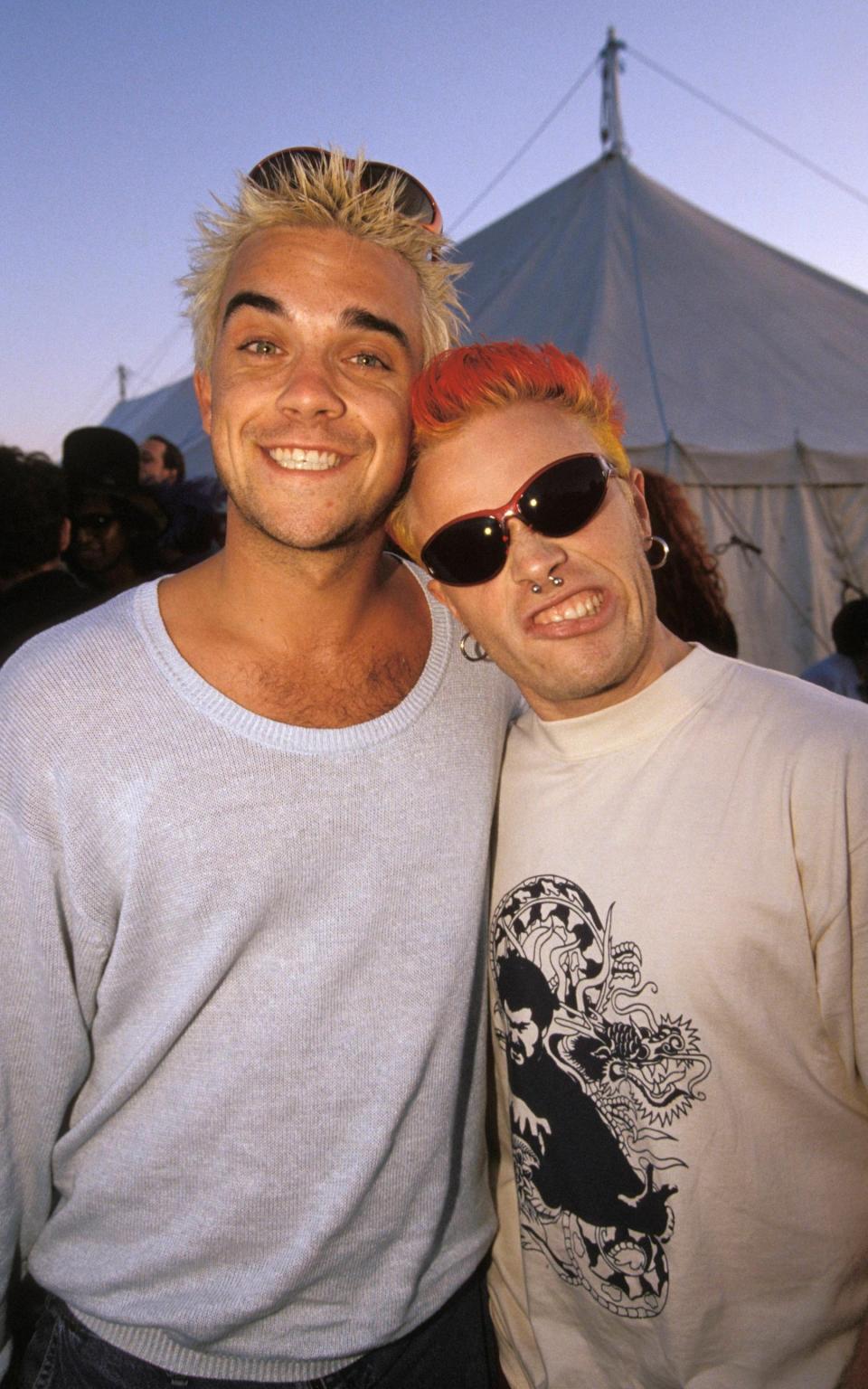
The album within, XXV, is a collection of his most famous songs from his solo career (a career that now, thanks to Covid hold-ups, spans a little more than the claimed 25 years), reimagined with an orchestra, along with a few new songs. He resists looking back, and is far more reluctant to blow his own trumpet than people might imagine.
Here’s a typical aside from this week’s conversations: ‘I fell into this whole career by some joyous mistake – I’m just fannying about and making it up as I go along and somehow stumbled into a stellar career that was beyond even my wildest dreams.’
In the same spirit, perhaps only Robbie Williams would kick off a discussion of an album revisiting and celebrating past glories by saying, ‘I’ve never been truly happy with what I’ve made or done.’ Nonetheless, he does eventually concede that returning to these songs did allow him to reassess what he may have achieved.
‘Maybe I hadn’t appreciated what I’d done nearly enough as I did it,’ he suggests. ‘I feel as though I may have been closer to where I wanted to be than I previously thought.’ As for these new arrangements, he says, ‘It gives the songs drama and import – it fancies them up.’ Judge for yourself, then, the interlocked layers of sincerity, irony, discomfort and playfulness laced within what he says next.
‘We’ve covered the bit where I’ve talked about the music now,’ he announces. ‘Can we go back to me?’
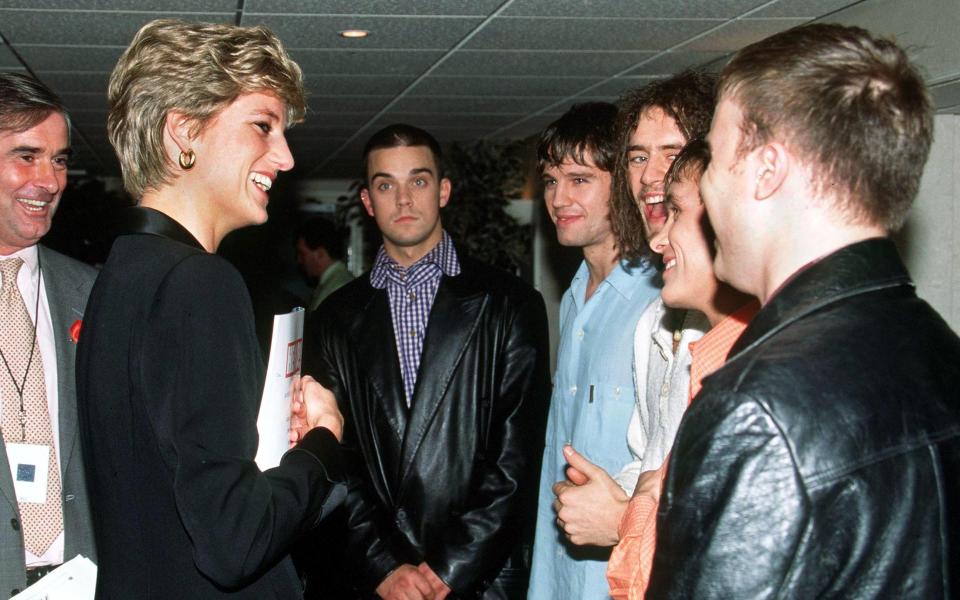
One particular irony here is that statements like this might bolster a sense that he is unengaged with what he creates in a way that would be wildly inaccurate. Compare the sentence above with what actually happened on the first afternoon I joined him at this Paris apartment.
From his computer, he played me new song after new song after new song – maybe 10, and there are several dozen more in the same playlist. Some are destined for a dance music project, Lufthaus, started during lockdown with two Australians, Tim Metcalfe and Flynn Francis, who he first worked with on his 2012 album Take the Crown.
Others, a salvo of more guitar-based songs, are for what he currently imagines as the next Robbie Williams album, the product of a very particular thought experiment: ‘I’ve decided to go back to 1995. I’ve just left Take That. And now, with the knowledge, musical knowledge that I have, what would be the album that I would make?’
He’s also excited to play me songs he’s solicited from people who made records he loved in his youth such as Placebo’s Brian Molko and The Beloved’s Jon Marsh. Along the way, he casually mentions other planned records, further in the future, already being mapped out.
And that’s barely the beginning of what he’s been up to. In his years of living in America, he’s been struck by the way that successful American entertainers (he mentions Kanye West, Jay-Z, Brad Pitt, George Clooney and Kevin Hart) seem to see no need to limit their ambitions. ‘So many people do so many different things, and it’s all branches of creativity,’ he says.
More and more, that’s how he’d like his life to be. He’d still make records, play concerts, but if he has his way, he’ll do far more. He begins to list things: ‘I’m also creating art. I’ve written a TV show. I’ve also designed my own clothing line. I’ve also created my own drink. I want to build a hotel. I want to create something big in business. What else? There’s loads. Talent competition. I wrote another musical. It’s just limitless and it’s endless.’ He laughs. ‘I’m going to be a very, very busy man.’
Discussing this, he brings up something apparently once written in his paternal grandmother’s school report, presumably intended as praise: ‘Will do well for the people she works under’. That, he points out, is where he comes from: ‘My whole lineage did the equivalent of working down the pit or were navvies who dug canals – people who worked under people.’
Just two generations on, he has been given a very different opportunity and he’d like to make the most of it.
He’s certainly not indifferent to the financial possibilities – for one thing, he likes his current lifestyle and it isn’t cheap – but mostly he says that he does all this because he has found it the best way to spend his time. On one hand, ‘It makes me happy and it makes me excited and it gives an outlet for my ambition that hasn’t stopped.’
On the other hand, it quells what might happen in its absence. He has long referred to the inner dialogue that takes over when he doesn’t use projects like this to take him out of his head, and his mind is given too much time and space to run rampant, as ‘Radio Rob’.
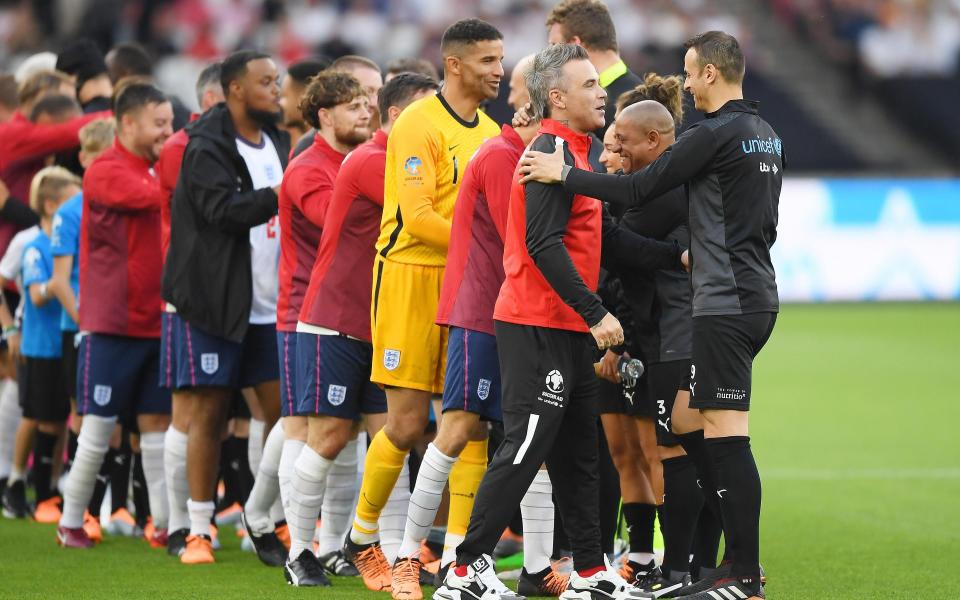
‘I don’t think you would know what to do with your day if you didn’t consume it with creating something,’ Field says to him, then adds, to me: ‘There’s something in Rob’s brain space that I think he wants to distract from so deeply that he goes into these obsessive-compulsive creation modes to drown that noise. I don’t know what happens in Radio Rob up there that makes him want to run away from it. But all I know is that thankfully, instead of drugs, it’s music and drawing and coming up with business plans and computer stuff.’
One creative outlet that has quietly existed in parallel with music for some time is art. Earlier this year he had an exhibition at Sotheby’s of a series of large black-and-white works, made in collaboration with his friend Ed Godrich, whose assurance seemed to perplex those looking to be scornful. (From a distance they might look like interlocking loops of abstraction, or intertwined piles of objects, but Williams offers something more specific: ‘If you’ve been to a rave, I’d see it as a thousand faces looking up at a drone.’)
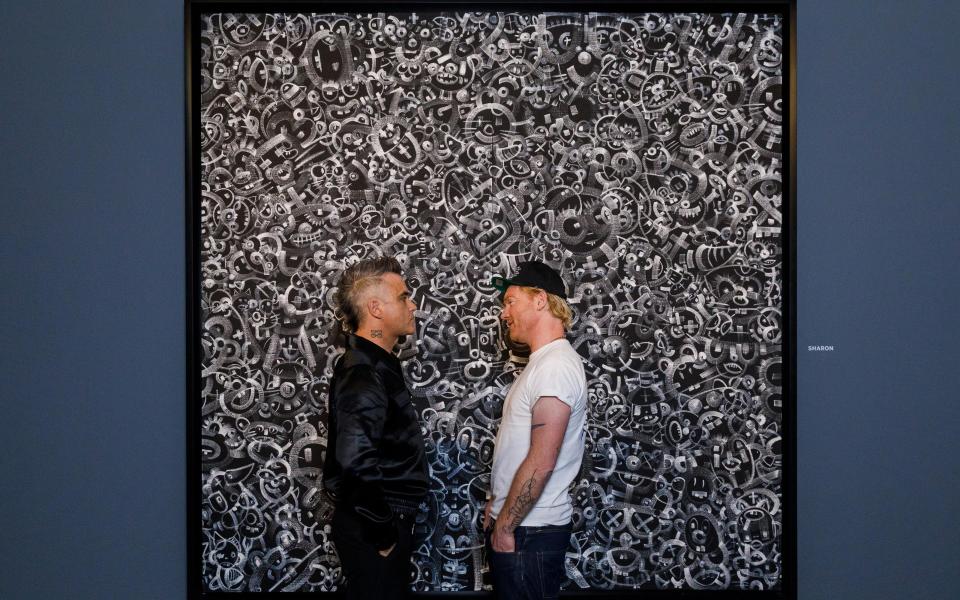
Meanwhile, he is constantly producing smaller, often more irreverent pieces, many of them fashioned on his iPad using an app called Procreate. On a recent flight from Los Angeles to Dubai and back he spent the entire journey doing this. ‘It’s just so much fun,’ he says.
He’s also planning to repurpose some of his iPad artworks, along with various other thoughts and slogans, for a clothing line, Hopeium, that he intends to launch in the next few months (the i am no longer mentally ill T-shirt was made as a sample).
If all of this was not enough, next year will also see the release of Better Man, made by The Greatest Showman director Michael Gracey, which will retell some version of the Robbie Williams story in movie form. From how its subject describes it, anyone expecting a squeaky-clean and straightforward rise-to-fame saga may be surprised.
‘Rightly or wrongly, I’m shining a light on both the good and the bad of my personality,’ he says. ‘I like the fact that there is fantasy in there and there’s a touch of surrealness in there too. It takes you somewhere that’s unexpected and it goes where you don’t think it would go. Michael Gracey is a magician and I’m very confident that the final thing will be really good.’
The film was shot earlier this year in Melbourne, and Williams flew to Australia for part of the shoot. ‘It was like being invited to the best birthday party in your honour that you somehow didn’t feel as though you deserved,’ he says. ‘It felt as though everything was about me, and that felt comfortable and uncomfortable. You know it was, “Wow, this is cool.” And also, “You don’t deserve this,” which is a constant theme running through absolutely everything that I’ve ever done.’ He laughs. ‘It’s probably in the movie too.’
Still, it was quite an experience. ‘Sat in a make-up room,’ he says, ‘surrounded by people that are playing your grandma, your dad and your mum.’ He was in a make-up room, incidentally, because in the film it seems that he is, at times, one of the actors who plays Robbie Williams. ‘I play myself some of the time,’ he explains. ‘Which I also do in real life.’
The theory of the four stages of fame to which Williams referred earlier is one that has been bubbling through popular culture for a decade or so, and turns out to come from a 2009 academic paper titled Being a Celebrity: A Phenomenology of Fame, a collaboration between Donna Rockwell of the Michigan School of Professional Psychology and David C Giles of the University of Winchester.
And he has misremembered. ‘Acceptance’ is not the fourth stage, it is the third. (The first and second stages turn out to be ‘Love/hate’ and ‘Addiction’; I’m pretty sure he considers he has these comprehensively mastered.) The authors’ fourth stage is actually ‘Adaptation’.
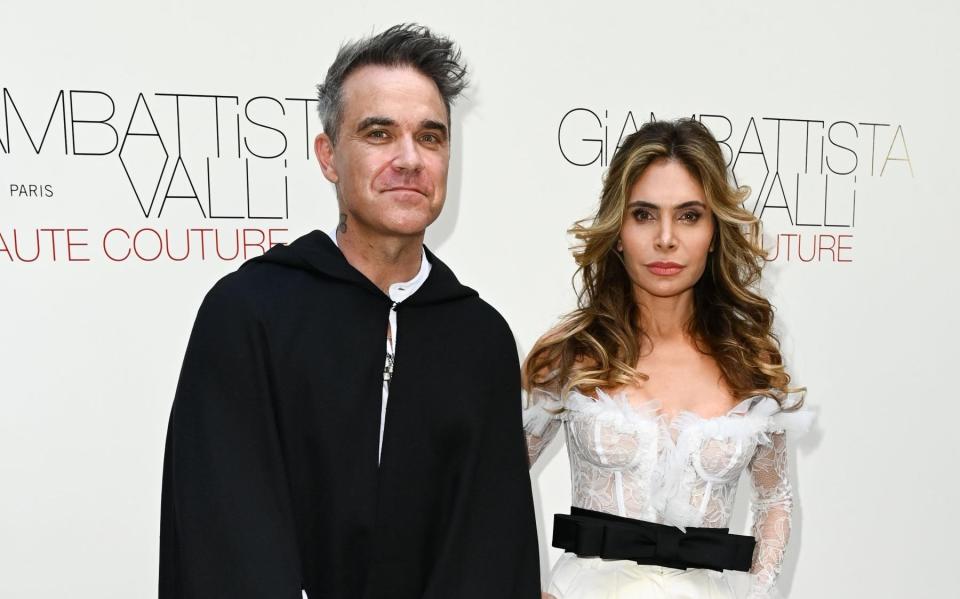
I message Williams to double check that these are the stages he had been talking about. They are. ‘And, yes, I’m stage four,’ he immediately replies. ‘Which sounds terribly terminal.’
But adapting, that sounds right too. And if it hasn’t always worked smoothly for him – ‘I dare say cocaine addiction was my first unsuccessful stab at Adaptation,’ he suggests – his more recent strategies, and the life he has created, seem to be working much better.
The last words he writes to me are: ‘In your mind you can go anywhere, but it’s best to give it a task…’ Or as he told me earlier, ‘Work, travel, family, purpose.’
Perhaps that’s one secret to playing the role of Robbie Williams for the long haul: that the freedom to fly is only freedom when you’ve got a place to land.
The single, Lost, is released on 5 August and the album, XXV, is out 9 September

 Yahoo News
Yahoo News 